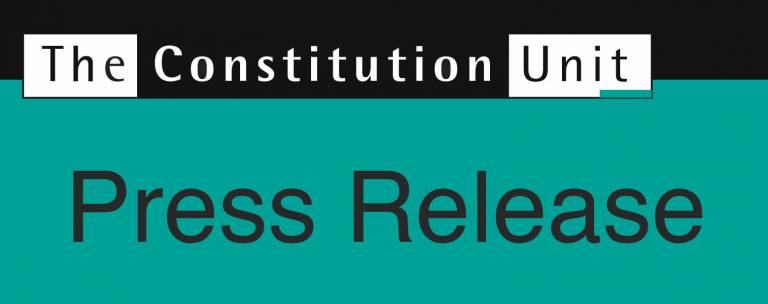Press Release: New report calls for regulation of prime ministerial appointments to the Lords
10 February 2015

A new report published today by respected think tank the Constitution Unit, and backed by other key constitutional reform bodies, calls for immediate moves to regulate prime ministerial appointments to the House of Lords. The report was launched last night at a high-profile event in the Lords, presided over by the former Lord Speaker and welcomed by various senior figures.
Increasing concerns have been raised about the growing size of the Lords. Since it was reformed in 1999 to remove most hereditary peers the chamber has grown by a third: from 666 members to almost 850. The Prime Minister retains complete control over the number of peers appointed, the timing of appointments, and how these are shared out between the parties (and independent Crossbenchers). David Cameron has appointed to the Lords at a faster rate than any other Prime Minister since life peerages began in 1958.
Several parliamentary committees have hence called for a transparent formula governing appointments. But no work has been done to test the viability of different formulae, and no agreement has been reached. This report fills the gap, by testing the effects of different formulae against possible election results 2015-25. It confirms that the formula favoured by the 2010 coalition government has disastrous consequences for size: requiring the chamber to possibly grow beyond 1300 members in 2015, and 2200 in 2025. But if each new batch of appointments instead guaranteed fairness between the parties, numbers could be stabilised, and even reduced.
Key recommendations in the report include:
- Ending prime ministerial control over the number of peers appointed and balance between them - instead handing this control to the independent House of Lords Appointments Commission.
- A size limit to be placed on the chamber, 550 or 600.
- A clear formula to be applied, basing each new batch of appointments on share of party votes at the previous general election.
- The House of Lords Appointments Commission to invite nominations from the parties using this formula, and based on a one-in-two-out principle (i.e. one vacancy for every two peers departing) until the size cap is reached.
- This system to operate until large-scale Lords reform is agreed, which will be a minimum of two years after the general election.
Commenting on the proposals, the report's lead author and acknowledged expert on Lords reform Professor Meg Russell said: "growth in numbers in the Lords, especially since 2010, are driving up costs and driving down efficiency - and with the general election looming there are rumours of more appointments to come. It would simply be irresponsible for the new prime minister post-May 2015 to continue with the present system. It is plainly inappropriate in a modern democracy for the head of government to decide the size and make-up of one chamber of parliament, and the size of the Lords now risks spiralling completely out of control. This report sets out clearly the principles for a more regulated and sustainable system. The two main party leaders should be pressed to commit to its recommendations with immediate effect".
The report's launch in the Lords was chaired by the former Lord Speaker Baroness Hayman. The former chair of the House of Lords Appointments Commission Lord Jay of Ewelme, provided a preface, and argued at the launch that "we have to get the numbers down", lending his support to "giving the Appointments Commission more powers to implement a new agreement", including a size cap and appointments formula for party peers. Likewise Lord Grocott, Lords Chief Whip 2002-08, argued for "the Appointments Commission deciding on the frequency of new batches of appointments and deciding on the overall numbers" because the size of the House of Lords is now "verging on the ridiculous and it needs to be dealt with".
The report has the formal backing of two other respected constitutional reform organisations, the Hansard Society and the Constitution Society. Andrew Blick, of King's College London and The Constitution Society, said "this report addresses what is potentially a major dysfunction at the heart of our constitution, likely before long to become too serious to ignore". In addition, Peter Riddell, Director of the Institute for Government lent support to the proposals, saying that "this report makes a powerful, convincing and evidence backed case for urgent action by the Prime Minister to adopt a new approach to appointing peers which will be fairer between the parties and permit a much needed gradual reduction in the size of the House of Lords."
Notes for Editors
- The Constitution Unit is an independent and non-partisan research centre based in the Department of Political Science at University College London.
- The report, Enough is Enough: Regulating Prime Ministerial Appointments to the Lords is available for download here (and includes a 1 page executive summary, and 1+ page list of key recommendations).
- A blog post summarising the arguments in the report is available
- Professor Meg Russell, Deputy Director of the Constitution Unit and lead author of the report is available for interview. Contact meg.russell@ucl.ac.uk or ben.webb@ucl.ac.uk.
 Close
Close


